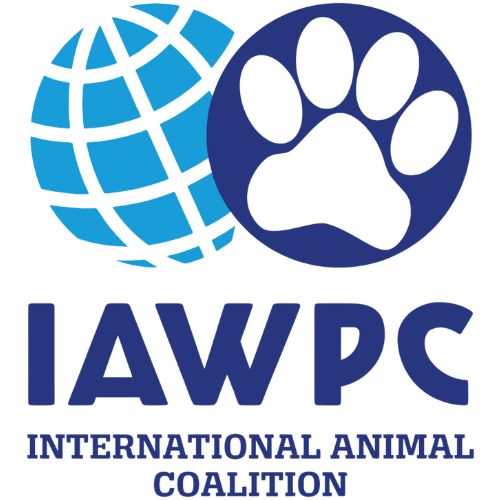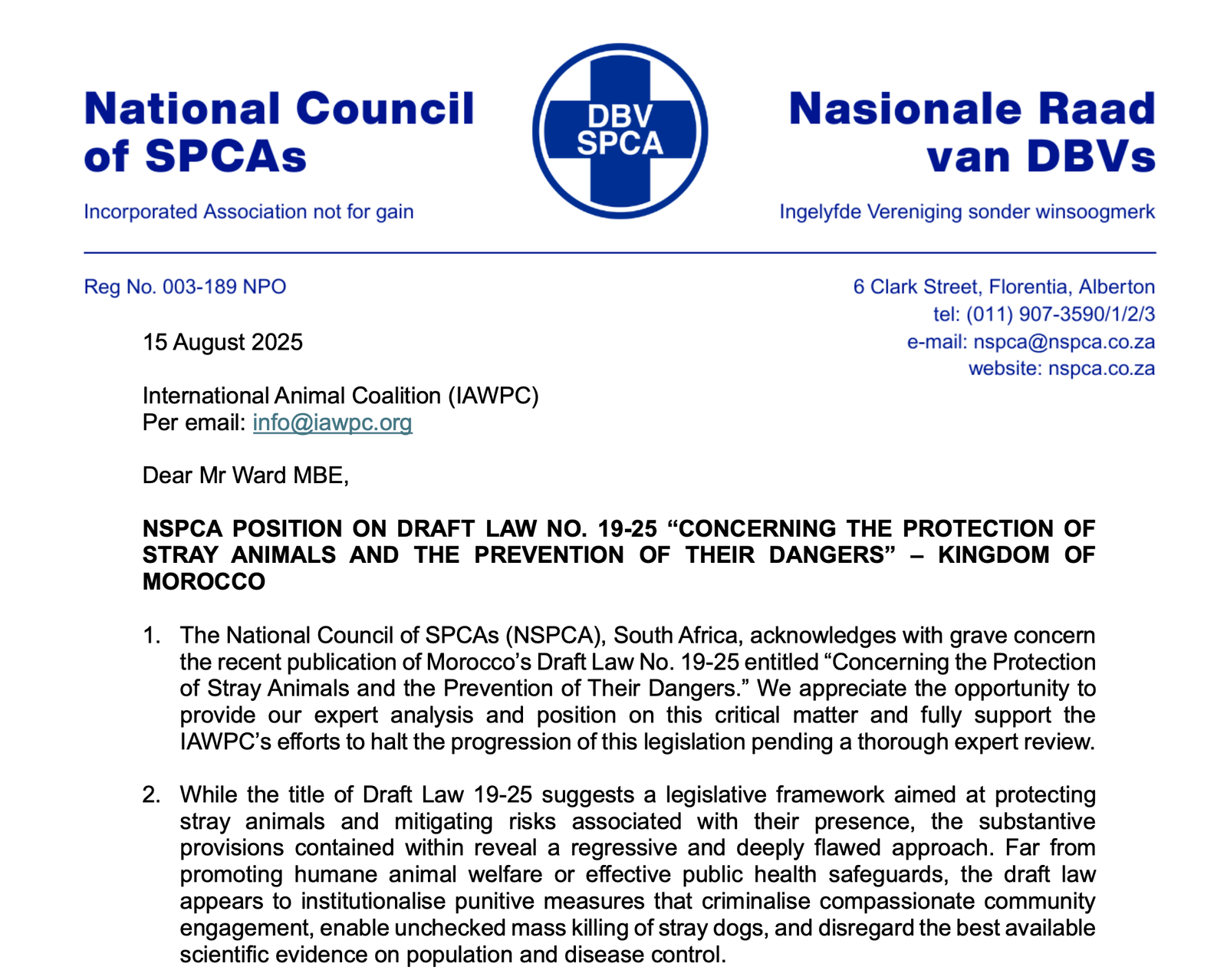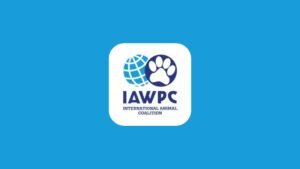The National Council of SPCAs (NSPCA), South Africa, expresses with grave concern the recent publication of Morocco’s Draft Law No. 19-25 entitled “Concerning the Protection of Stray Animals and the Prevention of Their Dangers.”
While the title of Draft Law 19-25 suggests a legislative framework aimed at protecting stray animals and mitigating risks associated with their presence, the substantive provisions contained within reveal a regressive and deeply flawed approach. Far from promoting humane animal welfare or effective public health safeguards, the draft law appears to institutionalise punitive measures that criminalise compassionate community engagement, enable unchecked mass killing of stray dogs, and disregard the best available scientific evidence on population and disease control.
This approach is not only ethically indefensible but also scientifically unsound, while causing significant suffering and unnecessary deaths among vulnerable animal populations.
Criminalisation of Compassionate Care (Article 5)
One of the most alarming provisions in the draft law is Article 5, which states unequivocally that no person may feed, shelter, or treat stray animals. This effectively criminalises all acts of kindness and humane care by individuals and civil society organisations, which are globally recognised as critical pillars in successful humane population management and welfare improvement.
Denying basic care to strays violates fundamental principles of animal welfare and compassion. It also undermines efforts by local communities, volunteers, and NGOs that provide shelter, food, and veterinary care, often filling gaps where government resources are insufficient.
Far from reducing health risks, starving and neglecting stray animals can increase aggression and desperation, leading to greater human–animal conflicts and potentially elevating the risk of disease transmission. Well-run feeding and sheltering programmes are shown to stabilise populations and reduce disease spread when paired with sterilisation and vaccination.
The criminalisation of care directly conflicts with the recommendations of the World Organisation for Animal Health (WOAH), WHO, and numerous international animal welfare declarations which endorse community engagement as essential to humane animal management.
Absence of Mandated Humane Population Control Measures
Draft Law 19-25 references “control of reproduction” but does so in vague terms and does not require any enforceable programme of sterilisation, rabies vaccination, or humane population management.
Extensive studies and global expert consensus affirm that trap–neuter–vaccinate–return (TNVR) or equivalent sterilisation programs are the only sustainable, effective, and humane methods for controlling free-roaming dog populations.
The 2018 WHO Expert Consultation on Rabies explicitly states that mass killing of dogs fails to control rabies or reduce dog population density in the long term and often undermines vaccination efforts. Morocco, being a country with endemic rabies, should adopt vaccination and sterilisation strategies aligned with these international standards to safeguard both human and animal health.
Culling causes a “vacuum effect” whereby removed animals are rapidly replaced by unsterilised dogs, sometimes increasing the number of susceptible animals and prolonging disease transmission cycles.
Enforcement and Punitive Orientation versus Welfare Promotion
The draft law prioritises administrative powers for seizure, detention, and punitive sanctions including fines and imprisonment of individuals who seek to assist stray animals. This enforcement-heavy framework lacks any substantive provisions for community education, responsible pet ownership promotion, or engagement with NGOs and civil society.
Successful animal welfare legislation integrates education, vaccination, sterilisation, community participation, and owner responsibility to ensure sustainable improvements.
Dangerous Provisions for Mass Euthanasia (Article 13.8)
Article 13.8 authorises euthanasia of strays deemed “threatening” or “unlikely to recover,” but provides no clear procedural safeguards, transparent criteria, or independent oversight.
Without mandatory reporting, monitoring, or independent review, such provisions open the door to secretive mass killings, often conducted with inhumane methods, and without accountability.
Humane euthanasia must be the last resort and carried out only by trained professionals following strict guidelines; mass culling, particularly without community consultation or transparency, contravenes global animal welfare norms and may breach Morocco’s international obligations.
Lessons from South Africa and International Best Practice
In South Africa, the SPCA, other animal welfare organisations, and governmental veterinary services have for decades implemented large-scale TNVR and vaccination programs with notable success in managing stray dog populations while safeguarding public health.
This approach combines:
• Community involvement and education
• Responsible pet ownership promotion
• Humane sterilisation and rabies vaccination
• Open and transparent oversight of all interventions
This multi-faceted strategy aligns with international standards from WHO, WOAH, and the World Veterinary Association, and exemplifies a compassionate, effective, and sustainable model which Morocco should consider as a blueprint for reform.
Conclusion
Draft Law No. 19-25, in its current form, represents a dangerous regression in humane animal welfare and public health governance. It risks institutionalising cruelty, undermining community goodwill, and perpetuating ineffective, outdated mass killing practices that international bodies have repeatedly condemned.
The NSPCA strongly urges the Moroccan Government to:
• Immediately suspend all legislative processes concerning this draft law
• Convene a panel of independent, international experts in animal welfare, veterinary public health, and legislative drafting
• Engage in transparent, multi-stakeholder consultation including civil society organisations, animal welfare experts, and affected communities
• Redraft the law to incorporate enforceable provisions for humane population control, vaccination programs, community engagement, and welfare promotion
• Ensure compliance with international animal welfare standards and Morocco’s treaty obligations
The NSPCA fully endorses and supports the International Animal Coalition’s (IAWPC) urgent campaign to prevent this harmful legislation from being enacted and to promote progressive, humane alternatives in Morocco.
Les Ward, chairman of the International Animal Welfare Protection Coalition (IAWPC), formed of 28 respected global animal charities including the NSPCA, who are united on issues of international concern, said: “This is mass killing dressed up as welfare. Morocco’s draft law not only criminalises kindness, it gives the green light to cruelty on a shocking scale.
“With the world’s eyes turning to Morocco ahead of the World Cup, we are calling on the government to halt this regressive legislation and adopt humane, science-based solutions. The international community and the Moroccan people will not stay silent.
“The IAWPC is calling for Morocco to suspend the draft law, listen to the people and engage in a transparent and democratic multi-stakeholder consultation.”




